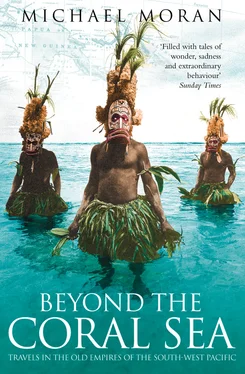‘What the hell is that?’
‘A sort of parasite drills into the sword and works its way up the shaft into the brain. The fish goes mad.’
‘What a place! Look, Ernie, I’m going to Kwato tomorrow, so I might call in on the way back.’
‘It’s up to you.’
I could not quite leave this mine of information without a last question.
‘A lot of interesting people came through Samarai, didn’t they? Malinowski, for instance.’
‘Oh, him. You know he used to take opium while he was on the Trobriands? Probably did here too. Hancock, was it Hancock? Can’t remember. Anyway, old Hancock told me about it. He was a little boy when the great man came here. Malinowski criticised him as being a spoilt brat in the famous diary. Payback.’ He chuckled.
‘Come over and see me for a couple of months. We can just eat and drink there … on the beach. I’m working on another boat at the slipway just over there. You could help. Want to earn a few kina ?’ 1
A boy of about ten was running about behaving strangely, banging the walls of the warehouse with his head, laughing manically and fighting off a group of teenage tormentors. He seemed to have no control over his muscles and flopped about like a rag doll.
‘He’s a bit simple,’ Ernie answered my enquiring glance. Boys were leaping into the water in an endless circle.
‘May see you tomorrow then. Come over for a month.’ He wandered away towards the Ladua.
I was sitting on the edge of the wharf when suddenly I was struck from behind by the flailing fists of the disabled boy. He seemed to have gone completely mad and was making the constricted sounds many damaged people make. It became quite painful and I began to slip towards the water. Some of the local boys rescued me and used the incident to give him another beating. He disappeared round the corner of a shed squealing like an animal.
I crumpled in the shade against the gnarled bole of an ancient rosewood growing near a tiny beach. Fragile canoes with delicately lashed outriggers were drawn up amidst scattered coconuts stranded by the tide, the fibre of the husks trembling in the breeze. Women were leaving the market with bundles and launching their canoes to paddle to nearby hamlets. I drifted off to sleep under a blazing copper sky only to be woken by a lizard crawling down my neck. A mangy dog began timidly to sniff my boot as dusk softly enfolded the island in the wings of a giant moth.
The grass-paved street that led back to the guesthouse was dusted with pink and white frangipani rouged by the last light, the pink trunks of coconut palms leaning over a darkening sea. The lonely bell from the Anglican church marked the hour. Wallace was seated on his usual perch by the table playing patience.
‘So, you’re back. I thought you’d been eaten!’ and he laughed wickedly.
‘No, but I almost ended up under the wharf. That disabled boy tried to push me in.’
‘Oh, he’s harmless, a sweet child really. Tomorrow you go to Kwato. The pastor is coming in the morning to take you over.’
‘Great. Look, I’ve bought a few beers, Wallace. Let’s have one and you can tell me about that Englishman.’
‘Oh, him! Not much to tell.’ He grimaced as if I had prodded a painful injury.
‘He came to Samarai like they all do for a few days, but stayed on. He decided we could restore the guesthouse and went back to England to get the money. Work began and the scaffolding was put up. I built a dancing area in the traditional style.’
‘Yes, I saw it. Beautiful local carving on the posts and boards under the roof.’
‘Beautiful, yes. But I only used it once. He was an alcoholic and ran up debts everywhere.’
‘I had an Irish business partner like that. He drank all the profits.’
‘Well, then he left, disappeared into thin air taking what was left of the money with him. I had huge bills to pay. Electricity, workmen. It broke me.’ I began to understand why the whole building was surrounded by old, bleached scaffolding. Time had stopped for Wallace as it had for Mrs Havisham.
‘Did you tell the police?’ The moment I asked the question I realised it was ridiculous out here.
‘The police? They aren’t interested in things like that.’
‘Yes, but …’
‘He’s being sought in London. He’s thought to be in Thailand.’ The story had the faded, melancholic glamour of a sepia print.
‘He sounds a typical predator. Islands attract them.’
Dinah was preparing dinner and the table had been set with more bright green cordial and chicken, taro and pineapple. I poured a glass of pure, chilled rainwater.
‘Is there any local music?’ Mercifully, I had not heard any recorded music in the villages of East Cape, just distant garamut 1 drumming. The silence was inspiring.
‘Oh, yes! Music! That’s what I should be playing during the dinner.’
Depression had caused him to forget the past pleasures of hosting guests. Standards had slipped following the Englishman’s betrayal years ago.
‘My daughter is a singer. She’s made lots of tapes. I’ll get the recorder.’
He returned with an old recorder that had suffered the ravages of high humidity. The volume was either deafening or scarcely a whisper. Only one speaker was working. The songs were commercial and South Pacific in flavour, but professionally produced. The voice was very musical.
‘She calls herself “Salima”, which in Suau language means “canoe float”.’
‘Does she live on Samarai?’
‘No. She’s in Port Moresby now. All the young people leave the island to find work. My wife left too.’
Again he appeared to be wrestling with terrible dejection and unseen demons. The light went out of his eyes. He returned to playing patience. I battled with the volume control, not wishing to destroy the silence of the island night.
I had almost finished dinner when the two government officials returned from their seminar. They nodded towards me and padded upstairs. I had noticed with surprise their tiny travelling cases on the chairs of their open rooms. They rapidly caught up to my stage of dinner and introduced themselves as Napoleon and Noah. One was from the Sepik, the other from Morobe Province.
‘What’s the subject of your seminar to the councillors?’
‘Standing Orders. We need to explain the basis of the Westminster parliamentary procedure.’
‘My goodness, that must be quite a task.’
They glanced at each other suspiciously, sensing criticism.
‘They’re intelligent men. Serious men. The problem is just one of language. You know there are over eight hundred languages in our country. Explaining the concepts behind the English procedure is most difficult. Old English is a strange language for us. Standing Orders are supposed to make parliamentary business easier but in our culture … more difficult … some concepts mean nothing to these people even in Tok Pisin. Independence came before we understood how the system worked.’
They both looked dark and fierce with an almost excessive masculinity, as if it was my fault, then they smiled. Such extremes.
‘We’re having a party to celebrate the end of our mission tomorrow night at the Women’s House on the hill. You’re invited. And you, too, of course, Wallace!’
He was gathering in the flaccid cards as he thanked them, pleasure struggling up to the surface. The officials rose quite suddenly from the table and headed off to the evening session at the hall. Another hand of cards fluttered down. Wallace turned to me.
‘They always stay here, the ministers. Soon I will redecorate the entire hotel.’
He looked around the flyblown walls, the stump of his arm more than symbolic over the cards.
‘I plan a stylish refurbishment here. God will bring the cruise ships. Thousands of tourists will visit Samarai. You’re just the first of a great wave.’
Читать дальше












